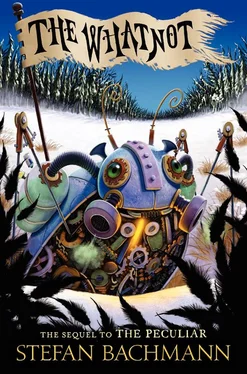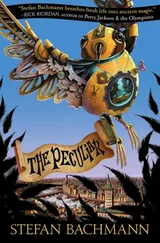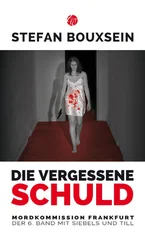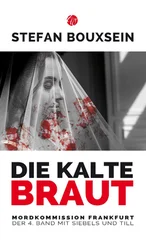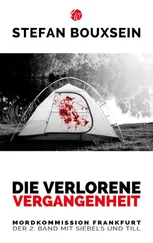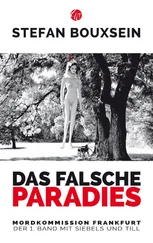“Thief!” the leadface shouted, his voice oddly flat and dull inside his iron half-helmet. “Thief!” But before he could see Pikey, Pikey was moving again, slipping under an archway and down a steep flight of steps, heart hammering.
The leadface charged up Bluebottle Street, flailing his bell. Pikey flattened himself against the gritty stone of the stairwell, just far enough down so that he could still see the street. He saw the black boots go by. He allowed himself a careful smile. The officer was running straight for the cobble faery. In five steps he would be flat on his face. Three. Two … And the officer kept right on running, hurtling toward the end of Bluebottle Street and the sooty flow of traffic on Aldersgate.
Oh. Pikey wiped his nose. Must have stomped that faery harder than I thought.
He leaned back against the slimy wall, waiting for the sound of the bell to become lost in the noise of the steam coaches and crowds. Then he strode up the steps and into the street, hands in his pockets, looking for all the world as if he had just gotten up and was off to sell matches or shine shoes or squawk the news at unsuspecting pedestrians.
Of course, he wasn’t. He had just snatched his supper and now he was going to find a quiet spot where he could eat it. Leadfaces were inconvenient; so were cobble sprytes, especially since they had supposedly been banned from the city months ago together with all the other faeries. But they were nothing Pikey Thomas couldn’t handle.
He picked his way back toward Spitalfields, careful to avoid the places where the leadfaces prowled and where the war agents sat at their painted recruiting booths. They were everywhere these days, and they went after most anyone they saw. “For Queen and Country!” they liked to bellow into their loudening horns. “For England, to eradicate the faery threat! Step right up, all men of hardy constitution!”
Pikey didn’t know if he had a hardy constitution, but he knew he couldn’t go to war. A year ago he would have. He was only twelve, but he would have signed up in an instant. The army had bread. It had thick coats and colorful banners and great bashing songs that made your feet want to march even if they didn’t know where they were going. And you got a musket, too, for shooting faeries, which sounded good to Pikey. But that was before. Before the snowy night in the chemist’s alley, and the blood between the cobbles, and the feet limping closer, straight toward him no matter how far he pressed himself into the dark. Before everything changed and he didn’t know what he was anymore.
From an alley, Pikey watched as a group of boys not fourteen hunched over a war agent’s table and signed their Xs on squares of brown card paper. When they had finished, the leadface handed them each a coat and a pair of huge scuffed boots. Then the boys were loaded into a wagon and it creaked away.
The leadface at the booth began scanning the passersby again, eyes invisible behind the dark holes of his helmet. Pikey hurried on. Those boys would be fighting soon, somewhere in the North. Fighting forests and rivers and whispery magic nonsense. He wondered if their boots would come back to London afterward, when they were gone, and be given to other boys.
He went up street after street, ducking into alleys when he heard the leadfaces’ shouts, hurrying beneath the drooping, blackened houses. They had been the mansions of the faery silk weavers once. Now they were the houses of pickpockets and bloodletters and the poorest of the poor. Sometimes a woman leaning out of a window, or another boy in the street, would spot Pikey and shout, “Oy, pikey!” in a not-very-nice voice. Pikey always hurried faster then.
Pikey wasn’t his real name. Or Thomas, either, for that matter. “Pikeys” were what folks called foreigners, and because Pikey had a face as brown as an old penny (whether from dirt or because he actually was a foreigner not even he knew), the name had stuck. As for Thomas, it was the name on the box he had come in, twelve years ago on a doorstep in Putney: Thomas Ltd. Crackers and Biscuits. Premium quality.
People had thought that funny once, coming from a cracker box. Pikey didn’t think it was funny at all.
In the pigeon-choked space in front of St. Paul’s Cathedral, a gang of boys accosted him.
“Give you a ha’penny if you show us your socket,” the oldest and tallest one snarled. He wore a blue coat with brass buttons, much too big for him, and a pair of boots with popped toes. He looked like the leader.
The other boys crowded around, prodding Pikey, dirty faces pressing in. “Yeh, show us your socket! What happened, eh? Did you see something you weren’t supposed to? Did Jenny Greenteeth pluck it out and string it up for a necklace?”
If Pikey’d had a socket he would have taken the boys’ offer in an instant. A ha’penny could buy him a proper meal, let him sit in the warmth and stink of an inn and eat potatoes and gravy and gray boiled mutton until he burst. But he didn’t have a socket, and the boys wouldn’t like what they saw.
“Shove off. Leave me alone.”
“Aw, come on, piker. Just a peek? Whada you say, fellas, you think we can see his brains through it? What say I pull off the patch and we get a look-see at his brains, all yellow and squishy inside.”
The boys murmured their assent, some more readily than others. The gang leader stepped forward, reaching for Pikey’s patch. Pikey braced himself for a fight.
“I said, shove off !” His voice went hard like a proper street rat’s, but he was too short to make it count. The boy in the brass-button coat kept coming.
Pikey ducked away, ready to run, but two of the boys grabbed his arms and pinned them behind his back.
“You stay where you’re put at,” one of them whispered, close next to his ear.
“Help!” Pikey croaked. There were people everywhere. Someone would hear him. Or see. The spot in front of St. Paul’s was one of the busiest in London, even in winter, even with the sky going black overhead. Costermongers shouted from their pushcarts, offering lettuces and cabbages and suspicious-looking roots. Peddlers haggled, servants bought. A red-and-gold striped cider booth stood not ten paces away, with a whole line of people waiting in front of it. They couldn’t all be deaf.
“Help, thief !” he cried.
No one even glanced at him.
“Stop cryin’ like a little pansy. We only want a quick look. Shut up, I say. Shut up, or you’ll get us all in trouble.” The leader planted a heavy fist in Pikey’s stomach, and his next shout came out in a puff of white breath.
He hung for a second, gasping, his arms still clamped behind him. He felt the leader’s fingers undoing the string of the eye patch, pulling it off.
“We only want a quick look—”
Pikey shut his eyes hard and threw himself back with all his strength. His head thudded against the head of the boy behind him and they both went down, rolling over the cobbles. Pikey landed on the other boy’s stomach with a satisfying squelch and sprang back up, one hand covering the place where the patch had been, the other swinging wildly.
The leader struggled to his feet and spat. “You little cog splinter. I’ll beat you blue—” He came at Pikey swiftly, the hobnails in his boots snapping against the ground.
“Pound ’im!” the boys shouted, jostling, forming a ring. “Pound ’is other eye out!”
Pikey didn’t have time to think. He flung up both hands to protect himself. …
The boy in the brass-button coat stopped dead in his tracks. The other boys went silent.
Too late Pikey realized what he had done. The eye where the patch had been was bared for all to see. He felt the cold sliding against it. He knew how it looked, what they all saw—a flat, empty orb, gray as the frozen sky. No pupil. Nothing like a regular blind eye. Only endless, swirling gray.
Читать дальше
